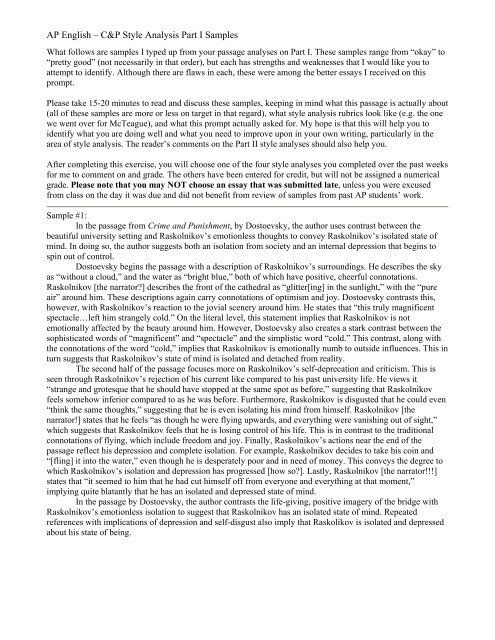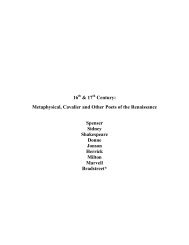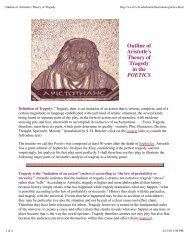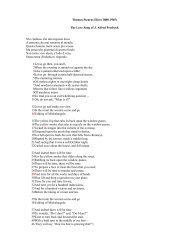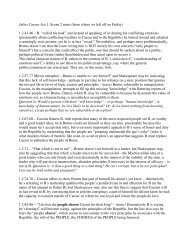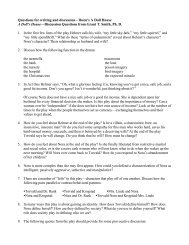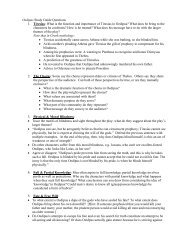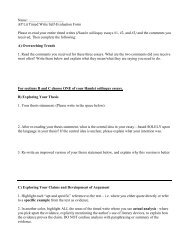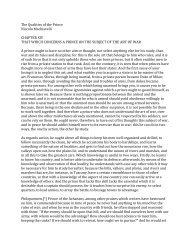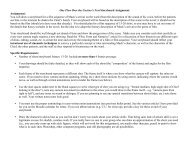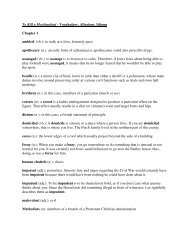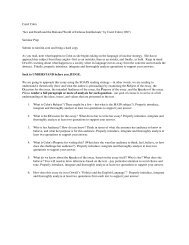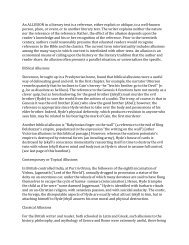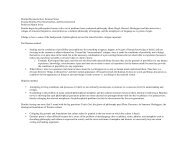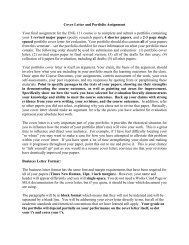AP English â C&P Style Analysis Part I Samples
AP English â C&P Style Analysis Part I Samples
AP English â C&P Style Analysis Part I Samples
- No tags were found...
Create successful ePaper yourself
Turn your PDF publications into a flip-book with our unique Google optimized e-Paper software.
<strong>AP</strong> <strong>English</strong> – C&P <strong>Style</strong> <strong>Analysis</strong> <strong>Part</strong> I <strong>Samples</strong>What follows are samples I typed up from your passage analyses on <strong>Part</strong> I. These samples range from “okay” to“pretty good” (not necessarily in that order), but each has strengths and weaknesses that I would like you toattempt to identify. Although there are flaws in each, these were among the better essays I received on thisprompt.Please take 15-20 minutes to read and discuss these samples, keeping in mind what this passage is actually about(all of these samples are more or less on target in that regard), what style analysis rubrics look like (e.g. the onewe went over for McTeague), and what this prompt actually asked for. My hope is that this will help you toidentify what you are doing well and what you need to improve upon in your own writing, particularly in thearea of style analysis. The reader’s comments on the <strong>Part</strong> II style analyses should also help you.After completing this exercise, you will choose one of the four style analyses you completed over the past weeksfor me to comment on and grade. The others have been entered for credit, but will not be assigned a numericalgrade. Please note that you may NOT choose an essay that was submitted late, unless you were excusedfrom class on the day it was due and did not benefit from review of samples from past <strong>AP</strong> students’ work.Sample #1:In the passage from Crime and Punishment, by Dostoevsky, the author uses contrast between thebeautiful university setting and Raskolnikov’s emotionless thoughts to convey Raskolnikov’s isolated state ofmind. In doing so, the author suggests both an isolation from society and an internal depression that begins tospin out of control.Dostoevsky begins the passage with a description of Raskolnikov’s surroundings. He describes the skyas “without a cloud,” and the water as “bright blue,” both of which have positive, cheerful connotations.Raskolnikov [the narrator?] describes the front of the cathedral as “glitter[ing] in the sunlight,” with the “pureair” around him. These descriptions again carry connotations of optimism and joy. Dostoevsky contrasts this,however, with Raskolnikov’s reaction to the jovial scenery around him. He states that “this truly magnificentspectacle…left him strangely cold.” On the literal level, this statement implies that Raskolnikov is notemotionally affected by the beauty around him. However, Dostoevsky also creates a stark contrast between thesophisticated words of “magnificent” and “spectacle” and the simplistic word “cold.” This contrast, along withthe connotations of the word “cold,” implies that Raskolnikov is emotionally numb to outside influences. This inturn suggests that Raskolnikov’s state of mind is isolated and detached from reality.The second half of the passage focuses more on Raskolnikov’s self-deprecation and criticism. This isseen through Raskolnikov’s rejection of his current like compared to his past university life. He views it“strange and grotesque that he should have stopped at the same spot as before,” suggesting that Raskolnikovfeels somehow inferior compared to as he was before. Furthermore, Raskolnikov is disgusted that he could even“think the same thoughts,” suggesting that he is even isolating his mind from himself. Raskolnikov [thenarrator!] states that he feels “as though he were flying upwards, and everything were vanishing out of sight,”which suggests that Raskolnikov feels that he is losing control of his life. This is in contrast to the traditionalconnotations of flying, which include freedom and joy. Finally, Raskolnikov’s actions near the end of thepassage reflect his depression and complete isolation. For example, Raskolnikov decides to take his coin and“[fling] it into the water,” even though he is desperately poor and in need of money. This conveys the degree towhich Raskolnikov’s isolation and depression has progressed [how so?]. Lastly, Raskolnikov [the narrator!!!]states that “it seemed to him that he had cut himself off from everyone and everything at that moment,”implying quite blatantly that he has an isolated and depressed state of mind.In the passage by Dostoevsky, the author contrasts the life-giving, positive imagery of the bridge withRaskolnikov’s emotionless isolation to suggest that Raskolnikov has an isolated state of mind. Repeatedreferences with implications of depression and self-disgust also imply that Raskolikov is isolated and depressedabout his state of being.
<strong>AP</strong> <strong>English</strong> – C&P <strong>Style</strong> <strong>Analysis</strong> <strong>Part</strong> I <strong>Samples</strong>Sample #2:As the passage progresses, Dostoevsky uses the resources of language to convey that Raskolnikov ismoving further and further into his on mind, and further from traditional society. Aspects of language that lendthemselves to Dostoevsky’s purpose are his ability to weave past and present ideas together, utilize metaphors,choose words that demonstrate Raskolnikov mentally isolating himself, and the use of sentences that wander andflounder much like Raskolnikov. Raskolnikov’s state of mind at the beginning is nostalgic, but Dostoevsky usesthe resources of language to portray a change from that to a state of mind that is alienated from his old thoughts,more conventional thoughts.Dostoevsky weaves together the past and present in Raskolnikov’s mind in order to emphasize thechange that Raskolnikov is going through. It is clear that Raskolnokov used to enjoy the view on his way homeand even knew that it was “at its best from the bridge about twenty paces away from the chapel.” He not onlynoticed the view, but made a point to find the place that looked the best. He calls it a “truly magnificentspectacle” but it still left him feeling “strangely cold.” In this way, Dostoevsky uses the comparison of past andpresent to highlight Raskolnikov’s removed state of mind.Diction used when Raskolnikov is describing what he is thinking about illustrates how he is distancinghimself from his past self. At first Raskolnikov contemplates how many times when he was at the university hestood at the same spot and remembers the “vague and mysterious emotions it aroused in him,” but nowrecognizing that it left him feeling “blank and lifeless.” This comparison makes it seem nostalgic, because hecannot go back to his previous state of mind when he was mostly content to marvel and enjoy. Later in thepassage he describes the idea of trying to return to his past habits of mind as well as movement as “strange andgrotesque.” This is a recognition of how far Raskolnikov has moved from where he once was. Then Dostoevskyuses the repetition of the word “old” to portray the way that Raskolnikov is trying even more to distance himselffrom his past, and emphasize the isolated nature of his mind.The ability of language to go beyond the literal is a resource that Dostoevsky utilizes to illustrate thenature of Raskolnikov’s rejection of society. This happens when it says, “He felt as though he were flyingupwards and everything were vanishing from sight.” This is a way of saying that, mentally, Raskolnikov isleaving behind all of his “old thoughts,” like they were “vanishing.” The fact that he is flying upwards alsoimplies that it will be hard to return to where he was right before, if it is even possible. The coin is used tosymbolize society in this passage. All the time Rasolnikov is dwelling on his past life he is “unconscious” of thecoin he is holding in his hand. At the end, however, Raskolnikov “flung it into the water” to represent hisrejection of society and how its ideals were a part if his life. That is why the throwing of the coin made him feelthat “he had cut himself off from everyone and everything at that moment.” The feeling of flying and the coinmean more in the passage than their literal meaning, and through this use of metaphors Dostoevsky is using aresource of language to convey Raskolnikov’s progressively more isolated state of mind. (Ran out of time to talkabout syntax and write a conclusion)
<strong>AP</strong> <strong>English</strong> – C&P <strong>Style</strong> <strong>Analysis</strong> <strong>Part</strong> I <strong>Samples</strong>Sample #3:In this passage from Fyodor Dostoevsky’s Crime and Punishment, Dostoevsky uses diction to highlightdifferences between Raskolnikov’s beautiful surroundings and his empty state of mind. Also, through the syntaxof the passage, Dostoevsky shows how Raskolnikov is disconnected from his past life (his past actions,thoughts), which contributes to Raskolnikov’s emptiness. Through conveying Raskolnikov as empty,Dostoevsky reveals the personality change that Raskolnikov experienced after the murders of Alyona andLizaveta and Raskolnikov’s realization of this change as well.At the beginning of the passage, Dostoevsky describes the scenery if the palace and cathedral as“glitter[ing] in the sunset,” “truly magnificent,” and “without a cloud and the water was almost bright blue,”which is then contrasted with Raskolnikov’s empty mindset and emotions. The first part of the passage describesthe beauty of the palace and cathedral, especially from one particular spot that Raskolnikov had stood on manytimes before. Dostoevsky’s word choice, such as “bright,” glittered,” “pure air” and “magnificent spectacle”exposes the palace and cathedral as extremely picturesque and as a sight that should invoke strong, aweful [awefilled?]emotions in a person. However, in the second half of the passage, the emptiness that Raskolnikov feelsis revealed. Raskolnikov [the narrator?] explains how the view of the palace and cathedral “left him strangelycold” and how the “gorgeous picture was for him blank and lifeless.” Dostoevsky’s diction here shows thedisconnectedness of Raskolnikov from his surroundings and the emptiness he feels, which can be seen throughthe phrases “strangely cold” and “blank and lifeless.” Raskolnikov appears to not know why he feels so emptyby saying he “put off finding the explanation of it,” but later he thinks it weird how “he actually imagined hecould think the same thoughts, be interested in the same theories and pictures that had interested him…so short atime ago.” This later thought shows how Rasklnikov realizes the emptiness he feels is because of the murders hecommitted, because after this act he feel empty because he cannot be interested in the same things he wasinterested in before he killed Alonya and Lizaveta. Dostoevsky employs many dark words after his descriptionof the scenery, which is in contrast to Raskolnikov’s feeling of emptiness. Raskolnikov’s “blank and lifeless”and isolated feelings are contrasted to the “bright” and “magnificent” scenery, a device that Dostoevsky uses toexemplify Raskolnikov’s true state of mind.Dostoevsky’s use of ellipses furthers the reader’s impression of Raskolnikov’s emptiness because itconveys him as unsure and disconnected from his surroundings. The line “he actually imagined he could thinkthe same thoughts, be interested in the same theories and pictures that had interested him…so short a time ago”shows how Raskolnikov can no longer identify with his past thoughts and actions. The ellipses at the end of theline convey the idea that Raskolnikov is trailing off in his thought process, which means he is unsure of himselfnow. Dostoevsky also uses ellipses later, in the line “Deep down, hidden far away out of sight all that seemed tohim now – all his old past, his old thoughts, his old problems and theories, his old impressions and that pictureand himself and all, all…He felt as though he were flying upwards, and everything were vanishing from hissight.” The ellipses here is another example of Raskolikov’s feeling of emptiness, through his disconnect fromhis past. “Everything were vanishing from his sight” also shows how Raskolnikov has lost the ability to connectto his past or his surroundings, which also contributes to his emptiness. The ellipses shows this disconnect aswell because it show how Raskolnikov’s thoughts trail off before they are finished.Through Raskolnikov’s state of mind and disconnect, Dostoevsky shows Raskolnikov’s personalitychange to emptiness, and his realization of this change. Raskolnikov’s realization of his emptiness can be seenwhen he remarks, “It seemed to him, he had cut himself off from everyone and from everything.” Raskolnikovis able to realize that the murders he committed did change him in a negative way, so much so that he appears tono longer be able to really feel anything.Dostoevsky’s diction throughout the passage contrasts Raskolnikov’s surroundings with his state ofmind, and helps convey Raskolnikov’s feelings of disconnect and emptiness. The syntax that Dostoevskyemploys, especially his use of ellipses, shows how Raskolnikov is unsure of himself and cannot even finishthoughts. Through Raskolnikov’s stat of mind, Dostoevsky shows Raskolnikov’s realization of the changes themurders brought upon him.
<strong>AP</strong> <strong>English</strong> – C&P <strong>Style</strong> <strong>Analysis</strong> <strong>Part</strong> I <strong>Samples</strong>Sample #4:In this excerpt from Fyodor Dostoevsky’s Crime and Punishment, the author reveals much aboutRaskolnikov’s state of mind by juxtaposing the Raskolnikov of the past with the Raskolnikov of the present. Thesurroundings of Raskolnikov’s inner turmoil alienate him from the pristine scenery surrounding him, furtherenhancing Raskolnikov’s feelings of isolation, regret and impurity. Dostoevsky also employs unusual and tellinginstances of diction to emphasize particular ideas, especially that of Raskolnikov’s removal from his innocentpast.Dostoevsky juxtaposes Raskolnikov’s past with his present to demonstrate the dramatic shift incharacter that has recently occurred. This juxtaposition is achieved by placing Raskolnikov in a setting hefrequented as a student and then revealing his reaction to his encounter with the past. As a student, Raskolnikov“marveled at a vague and mysterious emotion” the setting roused in him, his troubles then were merely themeaning and origin of these emotions. However, now Raskolnikov can only “[recall] those old doubts andperplexities,” not feel the “cold” the palace had once evoked within him. Raskolnikov even thinks it “strange”that he should even “imagine he [could] think the same thoughts…that had interested him,” a clear and obviousdemonstration of Raskolnikov’s alienation from his past. This realization “wr[ings] his heart”, alsodemonstrating his regret, revealing that there has been an occurrence between his student days and the presentthat has drastically altered him for the worst that he cannot even connect with his own past “so short a timeago.”The setting that inspires Raskolnikov’s introspection also serves to further realize his isolation. The skyaround Raskolnikovis “without a cloud”, though the character himself is obviously muddled and in turmoil, hisown thoughts are cloudy. Likewise the water is “almost bright blue”, the Neva “glitters in the sunlight.”Meanwhile, Raskolnikov is dark and brooding, out of place in his surroundings. Dostoevsky’s use of setting isone of the subtleties the author employs to reveal Raskolnikov’s state of mind.Another subtlety lies within the diction of the passage. Dostoevsky manipulates the very syntax of asentence, such as where Raskolnikov reveals his separation from the “theories and pictures that had interestedhim” to read even deeper. In this case, Dostoevsky includes a simple three periods [ellipses] after the word“him” and before the next statement “so short a time ago.” The resulting pause and break between the twothoughts imply that while technically it was “so short a time ago”, the drastic change in Raskolnikov hasseparated him from his past much more than the lapse in time would imply. Later on in the passage, Dostoevskyplays with the same idea of old Raskolnikov and new by including the word “old” repeatedly in one lengthysentence. This sentence lists Raskolnikov’s “hidden” character aspects, his “old past…old thoughts…oldproblems [and] old impressions.” The resulting effect is once again Raskolnikov’s alienation from his own past.By juxtaposing Raskolnikov’s concerns of the past with those of the present, revealing his isolationfrom his pristine surroundings, and by creating subtle implications within the syntax and diction of the passage,Dostoevsky reveals much of Raskolnikov’s state of mind. What is revealed is alienation from the past and adeep sense of regret for this separation; however, it is not nostalgia but a want [desire] for an entirely differentquality of life than that of which he is currently living due to his unknown circumstances{*cough*murder*cough*)


